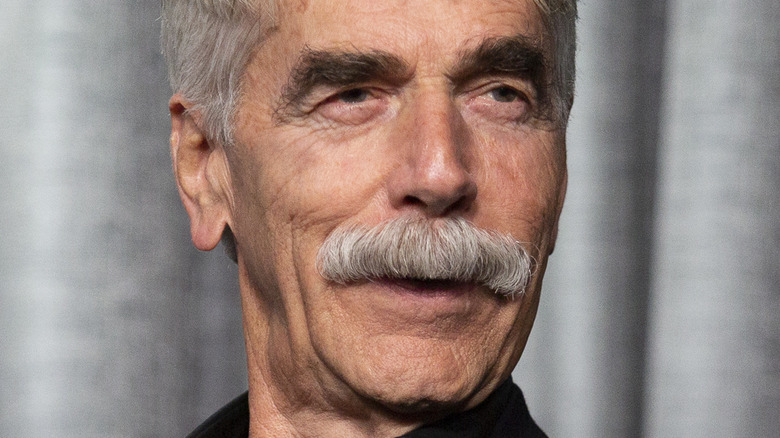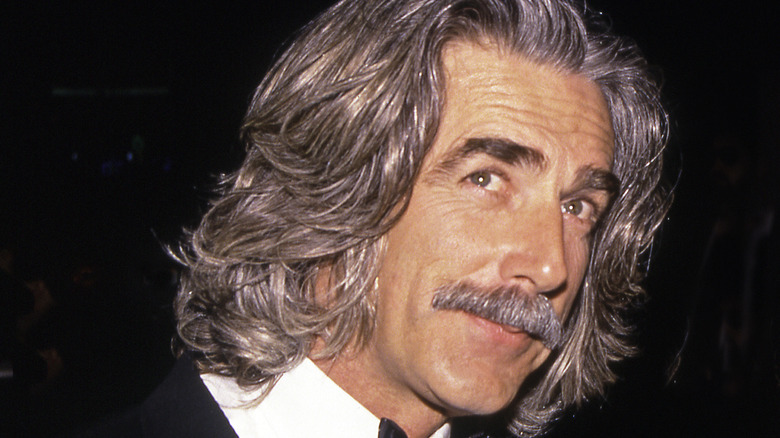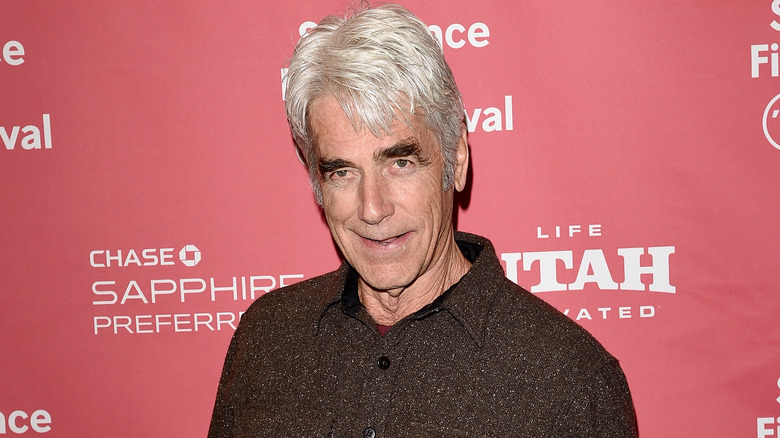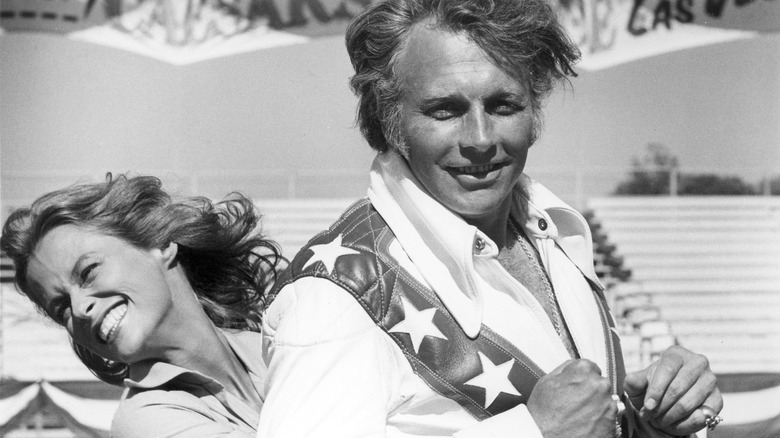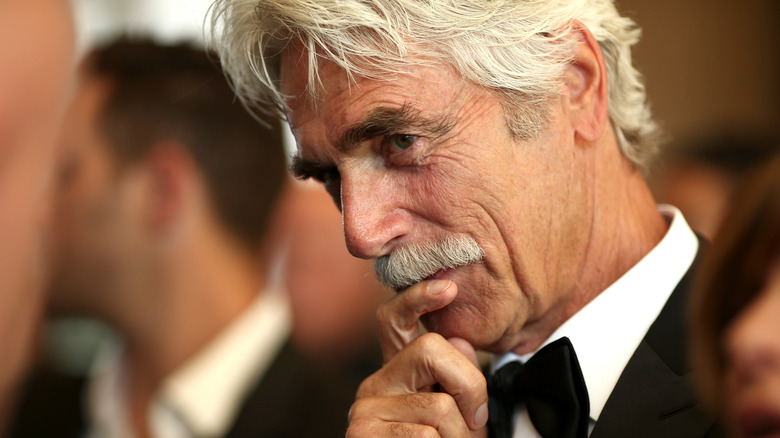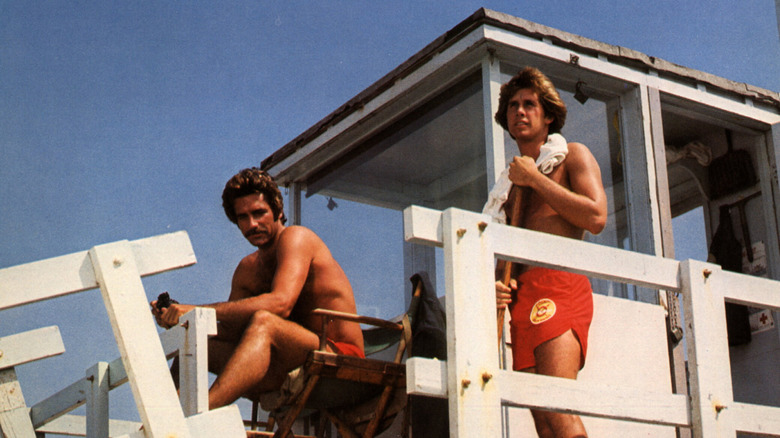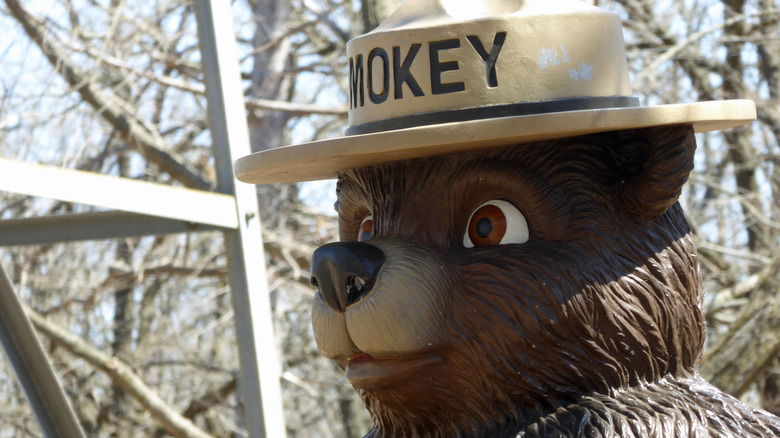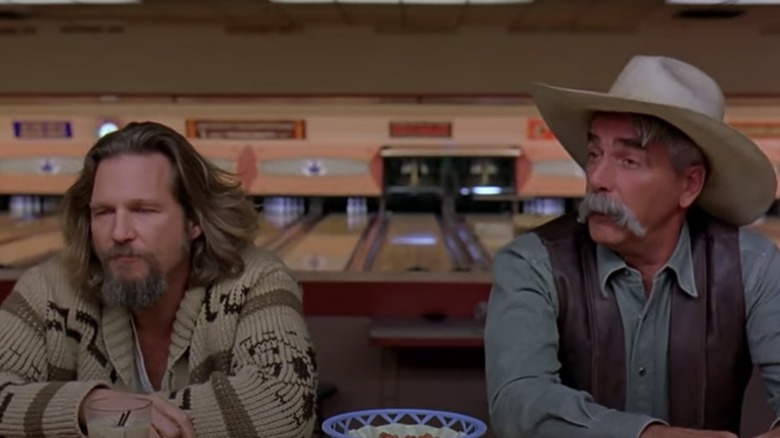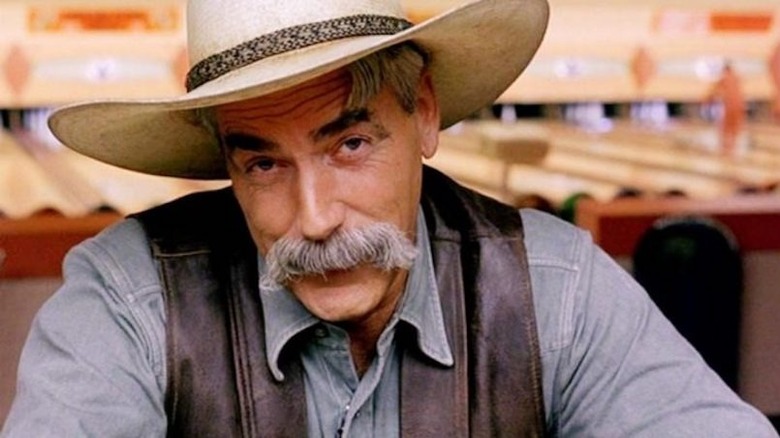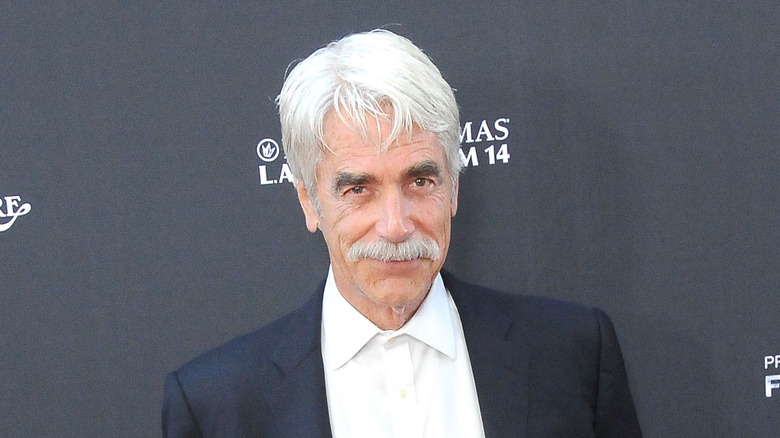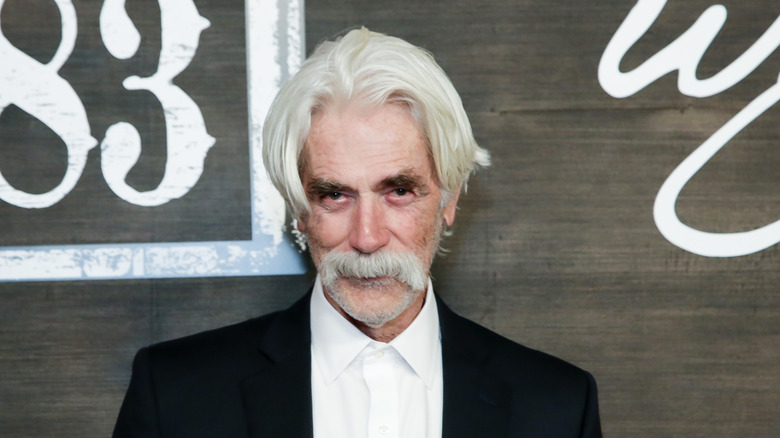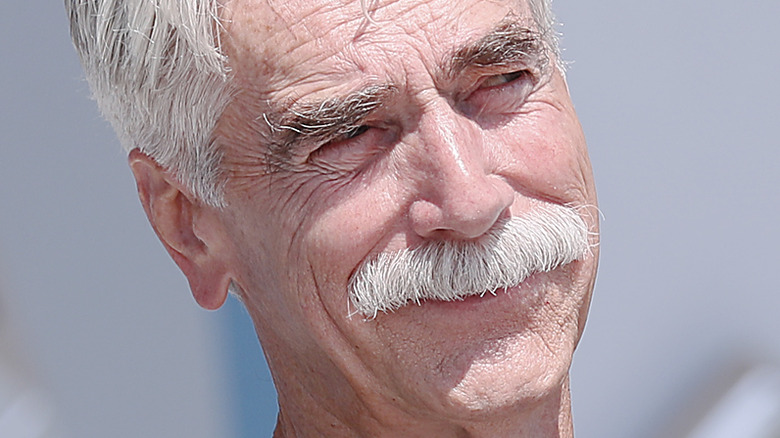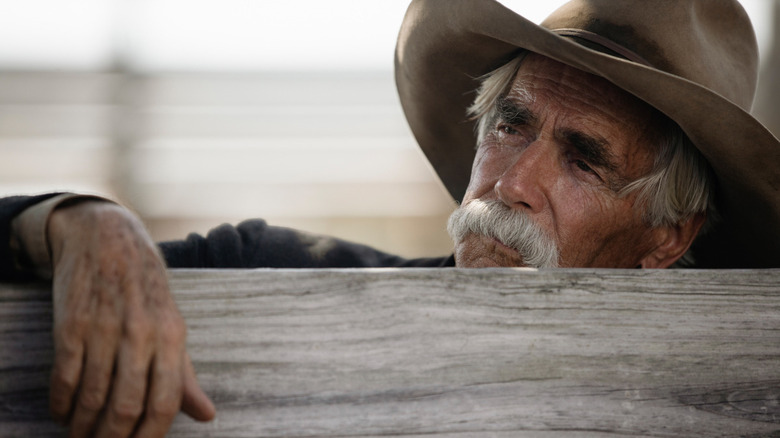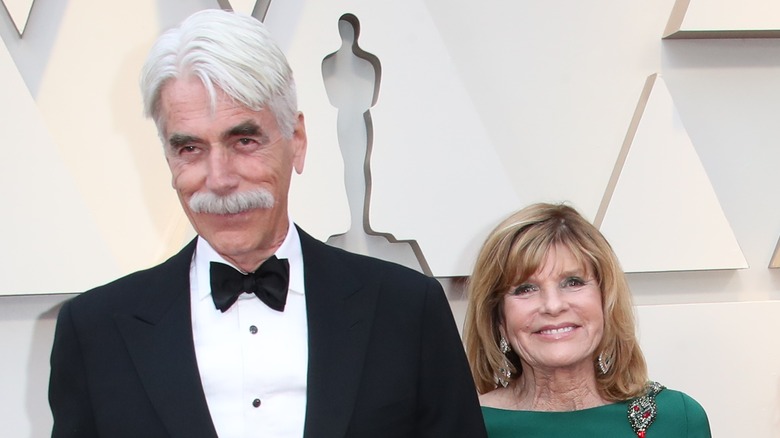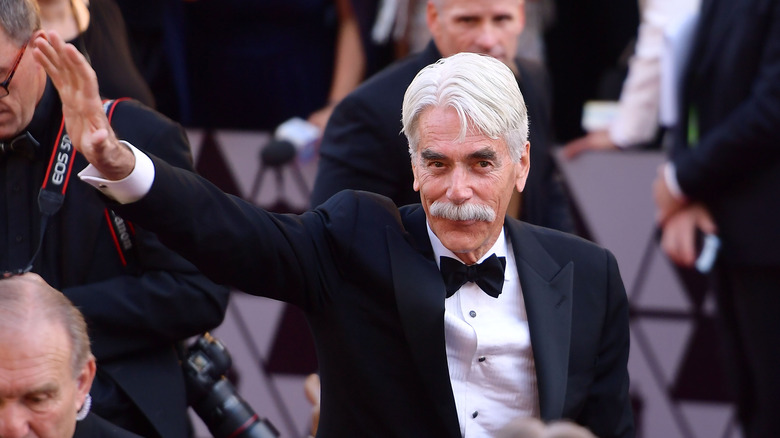What You Don't Know About Sam Elliott
Few actors in the modern era better personify the Old West than Sam Elliott. That's not surprising, considering he's appeared in a gajillion Westerns over the course of a Hollywood career spanning seven decades.
Of course, there's also that voice, an instantly identifiable baritone that has been used to great effect in TV commercials for everything from insurance to beer to trucks to snack food and more; in fact, as of February of 2022, iSpot.tv tracked 81 national television ad campaigns featuring Elliott's distinctive drawl. The fact that all that commercial work has had no negative impact on his acting career is a testament to the authenticity he brings to the screen, apparent in the memorable performances he's delivered throughout the years. Meanwhile, his ability to switch effortlessly between comedy and drama can be seen such films as "Road House," "A Star is Born," "The Big Lebowski" and "Up in the Air," to say nothing of his roles in TV series including "Justified," "Grace and Frankie," "The Ranch" and "Parks and Recreation," to name just a few.
Given that Elliott's onscreen career dates back to the late 1960s, and he's worked steadily ever since, there's no denying his is a familiar face — and voice — to film and TV viewers. Yet despite his longevity in the industry, there's still a lot about this laconic and iconic actor that may prove surprising. For proof, read further to find out what you don't know about Sam Elliott.
His father didn't think he'd make it as an actor
The notion of becoming an actor wasn't something that struck Sam Elliott like an epiphany, but had always been within him from a young age. "It's just something I've wanted to do since I was a little kid," Elliott told The Guardian in 2017. Elliott's dad, however, was not totally thrilled with his son's theatrical ambitions. "My father once said, 'You haven't got a snowball's chance in hell in Hollywood,'" Elliott recalled in an interview with AARP the Magazine. Rather than discourage him, those harsh words actually drove a young Sam Elliott to push even harder. "That motivated me," he explained. "My father was a good, practical man, but he came from a different time."
Sadly, Elliott's father never got to experience his son's success. As the Register-Guard recalled, he suffered a fatal heart attack at age 54. "That killed me," Elliott said. Speaking with The Off Camera Show, Elliott — who was just 18 when his father died — shared, "My dad died thinking I was a total idiot for wanting to be an actor."
"He saw only a play or two of mine before he died," Elliott told AARP the Magazine. "I think he'd be proud that his kid became the actor I did."
A construction gig built Sam Elliott's big break
While it's easy to look back at Sam Elliott's success as a foregone conclusion, his early years in Los Angeles trying to break into the business were not easy ones. In order to make ends meet, Elliott took a job in construction while pursuing his big break.
Ironically, it was Elliott's non-acting gig in construction that led to the very break he'd been seeking when he helped out a family friend with a construction job. As it happened, he told WNYC, that friend was an assistant director, and invited Elliott to hang out with him in order to get an inside look at the business of Hollywood. "My big break — pouring cement," Elliott joked.
That ultimately led to his first movie credit, a guy playing cards in 1969 classic "Butch Cassidy and the Sundance Kid." Elliott felt that he'd finally arrived, and quit construction. Looking back, however, he's quick to point out that his first big acting role certainly wasn't anything that gained him a whole lot of attention. Calling himself "a glorified extra," he recalled to WNYC, "I had one line, it was off-camera, I was nothing more than a shadow on a wall." Even so, he appreciated the experience of being on that set. As he said to Yahoo! Entertainment, "Watched [Robert] Redford work for a couple of days, that was fun."
He was cast as Evel Knievel in a pilot
Sam Elliott surely thought he'd hit the jackpot when he landed the starring role in a 1974 television pilot. This was no garden-variety TV show, but a series based on motorcycle-jumping daredevil Evel Knievel, at the time a wildly popular figure in American culture. As TV Obscurities pointed out, the series was a spinoff of a feature film about Knievel, starring actor George Hamilton, with Elliott tapped for the TV version. The premise of the series involved Elliott's character pitted against a female stunt performer "in a battle of the sexes motorcycle contest."
However, Elliott's dreams of becoming TV's Evel Knievel were dashed when CBS, the network that had ordered the pilot, declined to pick it up. That decision will appear to have been a wise one to anyone who watches the unsold pilot, which lives on thanks to YouTube. At the start, Elliott can be seen narrowly escaping an explosion before chasing down a bad guy, while a cheesy voiceover intones, "Evel Knievel, stuntman supreme. Setting records, thrilling crowds, and now battling the worst evil of all: crime."
Apparently, Elliott was not too thrilled to learn that the "Evel Knievel" pilot could be found on YouTube. When writer Will Harris mentioned this during an interview, Elliott offered a pithy response: "F*** me. ... Listen, we've all got stinkers out there, and if we're lucky then we survive."
Sam Elliott has 'casting couch stories'
Tales of sexual misconduct in Hollywood are nothing new, brought to the forefront in recent years by the shocking allegations against disgraced movie mogul Harvey Weinstein and the #MeToo movement that ensued. While the casting couch is typically something associated with male producers preying on female actors, as a handsome male actor, Sam Elliott was not immune from similar overtures. "You cannot believe the casting couch stories I could tell you," Elliott shared in a 1980 interview with the Dayton Daily News, adding, "The clichés are all true."
Elliott continued, "I've had propositions from men and women, and I've turned them all down. It's probably hurt me, but I'm the one who has to live with that guilt. My conscience is clear, even though my career is still not setting the world on fire."
Those past experiences clearly played a factor, decades later, when he voiced his support of #MeToo in an interview with Variety by describing the movement as "the best thing that's happened to Hollywood in a long time." While suspecting that it could be "a two-way street" for actors who have willingly done "anything to survive and thrive," he also lamented the "bunch of innocents that come to town that are just f***ing ground up by it."
He clashed with the studio over his first big movie
Throughout the early 1970s, Sam Elliott paid his dues with numerous guest-starring roles on TV series such as "Police Woman" and "The Streets of San Francisco." It all led to a starring role in the 1976 feature film "Lifeguard," a meaty role that could have propelled Elliott to stardom — had he not mercilessly trashed the movie while he was supposed to be promoting it.
As he explained in an interview with NPR, it had nothing to do with the film itself, but the movie poster. As Elliott recalled, he was shocked when he first saw the poster, which "had me in a pair of Speedos and a big-busted girl on either arm. And it said, 'Every girl's summer dream' over the top of it. And I was like, wow." As he pointed out, "Lifeguard" may have been marketed as a teen sex comedy, but his character's storyline was anything but, depicting a man at a crossroads coming to terms with whether to remain a lifeguard as middle age encroached.
Rather than keep his mouth shut, Elliott began openly mocking the marketing campaign during press junkets — which did not endear him to the studio. "I got myself in some hot water there," he said to NPR, describing himself as "honest, opinionated and not very smart at the same time. And that's a terrible combination for one to have." As he told Insider, "I never worked for Paramount again."
He and Smokey the Bear share a birthday
Sam Elliott has had the luxury of choosing his roles based on how interesting he finds them, and not how much he'll be paid. That's because he's made plenty of money by lending his smooth and distinctive baritone to television commercial voiceovers. That, he told The Guardian, has allowed him "a certain level of security" and enough freedom to pick and choose the projects he wants to take on. One of these was providing the voice of one of America's most iconic animated characters, Smokey the Bear. Pointing out that Elliott and Smokey were both born on August 9, 1944, Vulture wondered if this gig was "fated to be."
As the Washington Post noted in a 2014 profile, at that point Elliott had provided the voice of the ursine firefighter for a solid seven years. While he admitted that he gets "a real chuckle" from reciting Smokey's familiar catchphrase — "Only you can prevent forest fires" — he's also aware of the crucial nature of the character's purpose. "Smokey's message is really a very important one," Elliott said. "Putting out your camp fire is really something every American can do and feel good about."
Of course, Elliott never would have voiced Smokey had he listened to some advice he'd received early in his career to take diction lessons. "They wanted me to speed up and enunciate," he told the Saturday Evening Post. "I went through trying to do that for a time, but I'm glad it didn't work out."
The one film that changed the course of his career
Sam Elliott has appeared in dozens upon dozens of films, yet there are three that continue to loom large throughout his career: "Road House," "Tombstone," and "The Big Lebowski." "That's the big three," Elliott told Vulture. "None of them had great box office, and I wasn't so good in any of them." He said the films' enduring popularity came because "they repeat that s**t all the time."
While his appearance in "The Big Lebowski" — as a mysterious cowpoke who offers sage advice to Jeff Bridges' perma-stoned, bowling-obsessed character the Dude — was brief, Elliott believes the role set his career on an entirely different path than it had been on.
As Elliott said in Entertainment Weekly, he "was at that point in my career where I was thinking I was never going to be thought of as anything else other than a laconic cowboy." When he received the "Lebowski" script, he was expecting he'd play "some wacky f***ing character, as far as possible from being a cowboy." However, instead he discovered the character spoke in "this voice 'sounding not unlike Sam Elliott.' Then he shows up in a bowling alley dressed like a drugstore cowboy looking 'not unlike Sam Elliott.'" Elliott continued, "So, I went from feeling boxed-in, into just realizing how thankful I was that that was the box I was in, because it just led to all this other great work."
The Cohens made him do multiple takes just because
Given that the script for "The Big Lebowski" described the character Sam Elliott would ultimately play as both looking and sounding like him — written before he was even cast — it shouldn't be a surprise that the directors of the movie were already huge fans of his work. As Elliott told The New York Times, siblings Ethan and Joel Coen, who wrote and directed the film, had indeed pictured Elliott in the role, and were understandably thrilled when he signed on.
Elliott's biggest scene, set in a bowling alley, is actually the film's final scene. After the Dude (Jeff Bridges) bumps into Elliott's cowboy character in a bowling alley, he delivers a soliloquy to the camera. When shooting the scene, however, the Coens insisted Elliott keep doing take after take.
"That last day on that film, when I'm looking into the camera and talking to the audience, I'd done that scene eight [or] nine times and the brothers were [right there next to the camera]. I'd done the scene and I'd felt like I had nailed it more than once," Elliott recalled in an interview with Yahoo! Entertainment. "And I just looked at them and said, 'Hey, you guys gotta tell me what the f*** you want.' And they said, 'No, we got it on the third or fourth take, we just like seeing you do it.'"
Oregon holds a spot in Sam Elliott's heart
Sam Elliott was born in Texas, but spent his formative years growing up in Oregon, with The Oregonian noting that he moved there at age 13. Per The Oregonian, during a Q&A at the 2016 edition of the Television Critics Association press tour, he revealed he still felt a special connection to the state. "My mom's house is still [in Portland], and we still own it," Elliott said, referencing his late mother. "I still spend a lot of time there. I've got a place in the Willamette Valley, down near Eugene. I'm ultimately hoping to move back to Oregon."
In fact, Elliott told Eugene's Register-Guard that he and his wife spend a month each summer at their Eugene home, living the rest of the year at their home in Malibu. He also doubled down on his desire to eventually become a permanent resident of Oregon. "At some point, that's the dream," Elliott said. "I've always loved the Willamette Valley."
Elliott likes to remain low-key in Eugene, but has been regularly spotted buying groceries and gardening supplies at local retailers. He'd also become an aficionado of a Eugene fish-and-chips establishment, revealing he'd eaten there "three times this week." Elliott even accompanied his daughter to Eugene's Saturday Market, where he went incognito by wearing a stocking cap, even though it was July, "so I looked just as weird as the rest of 'em," he said. "I love the Saturday Market."
Sam Elliott has no interest in social media
Many actors maintain a connection with their fans via social media, tweeting their thoughts or sharing personal pics with their followers on Instagram. Sam Elliott is not one of those actors, and prefers to steer clear of social media entirely. "I don't have email. Twitter, Facebook — everywhere you look, people are looking at their hands," Elliott explained in an interview with AARP the Magazine. "In restaurants, it's like you're sitting in a patch of jack-o'-lanterns because everyone's face is lit up by their phone. Nobody's relating to each other."
Avoiding social media, however, hasn't done anything to diminish Elliott's popularity. In fact, Elliott added, he's found that as familiar as his famous face has become, his distinctive voice is even more identifiable to the public.
"My voice gets recognized before anything else," he said in AARP. "It's always gotten attention. In choruses at church and school, I started as a tenor, moved to a baritone and finally became a bass. I knew then that my voice would be my instrument." In fact, whenever he seeks anonymity in his private life, he's come up with a novel solution. "Now if I want to hide, I just keep my mouth shut," he quipped.
He doesn't get the obsession with his mustache
As familiar as Sam Elliott's voice has become, so too has his signature mustache. While he's occasionally gone bare-faced at various times throughout his career, he prefers the 'stache; as he told AARP the Magazine, he "did feel naked without the mustache" when he'd shaved it off for a recent role. Then again, he did point out that he "was one of the early guys from my generation to have hair on his face. Me and Tom Selleck, and I was first."
Interviewed by Vanity Fair, Elliott commented on a scene in his film "The Hero," in which a fan of his character, a long-in-the-tooth movie star, tells him how enamored she is of his mustache. "It's such an odd thing, isn't it?" Elliott mused, admitting he didn't quite understand why the public seems to be so obsessed with his facial hair. "The whole mustache thing is a mystery to me," he confessed. Offering an example, he noted that "somebody showed me on their cell phone one day that there was this contest online between me and [Tom] Selleck about who had the best mustache," he said with a laugh. "It's so bizarre."
He hasn't gotten around to watching Yellowstone
One of the biggest television success stories in recent years has been "Yellowstone," the Kevin Costner-starring series that the Paramount Network has declared to be "cable's #1 hit." The show's success led to the development of a prequel spinoff for the Paramount+ streaming service, "1883," set in the titular year. The series follows the exploits of the forebears of Costner's character, rancher John Dutton, with country singers (and real-life spouses) Tim McGraw and Faith Hill playing the character's ancestors, James and Margaret Dutton. Sam Elliott is another member of the roster. Per a network press release, he plays Shea Brennan, "a tough as nails, handsome cowboy with immense sadness in his past," who guides the Duttons from Texas to Montana.
While Elliott certainly brings gravitas to the show, he admitted that he hadn't actually seen "Yellowstone," the show from which "1883" sprang. "I hear that ['Yellowstone' is their favorite show] from a lot of people but I must say I've never watched it," Elliott told DC Film Girl. Even so, he's confident "1883" is strong enough to be its own thing. "That said, the only thing that ties it together, in reality, is that it's a prequel to how the Duttons got to Montana in the first place," he explained. "If there were no 'Yellowstone,' '1883' would be happy to stand on its own, I'm sure."
He and wife Katharine Ross go way back
Not only did "Butch Cassidy and the Sundance Kid" herald the big-screen debut of Sam Elliott, it was on the set of the 1969 movie that he first glimpsed his future wife, actor Katharine Ross. However, never once spoke to Ross, best known for playing the bride of Dustin Hoffman's character in "The Graduate." He told AARP the Magazine that he "didn't dare try to talk to her then," given she was the film's "leading lady" opposite stars Robert Redford and Paul Newman, while he was simply "a glorified extra in a bar scene."
Nearly a decade later, he encountered Ross again. This time, however, they shared top billing in the 1978 film "The Legacy." It was then, Elliott recalled, "that we actually interacted." As Country Living noted, their budding romance was complicated by the fact that Ross was still married to her fourth husband (they divorced in 1979). Ross and Elliott wed in 1984 — which led him to nearly pass up his now-iconic role in "Mask," according to The New York Times, because they were on their honeymoon when the offer came through.
Happily married since then, Elliott summed up the secret to their enduring marriage when he told AARP the Magazine that he and his wife "have a common sensibility, but we also work at being together. You work past the s**t; you don't walk away from it. That's how relationships last."
Sam Elliott has built up an impressive net worth
Sam Elliott has been acting professionally for well over five decades. During all those years, he's not only amassed a hefty roster of screen credits, he's also built up a tidy nest egg. According to Celebrity Net Worth, Elliott's fortune is estimated at a cool $20 million.
However, Elliot's career has never been driven by dollar signs. "I've never done a job for money... I've always basically made my own decisions. And I think I've done reasonably well," he told The Guardian. According to Elliott, he's more attracted to a great script than a lucrative payday. "But to me, it's all about what's on the page," he explained. "It's not about working for money."
Of course, he pointed out that's also led him to appear in movies "that basically no one saw" — and he's totally fine with that. In the end, Elliott admitted that he's less concerned with his cinematic legacy than with how he feels in the moment, and the people that he's working with. As Elliott noted, it's all about "enjoying the process. ... And if you can't enjoy that, then you're going about it wrong." Sometimes you eat the process, sometimes the process eats you.

